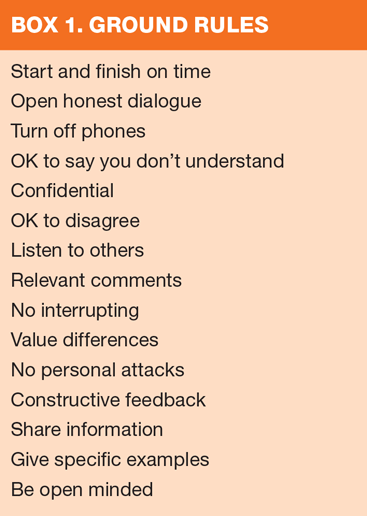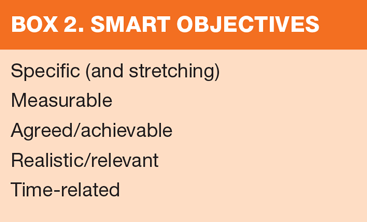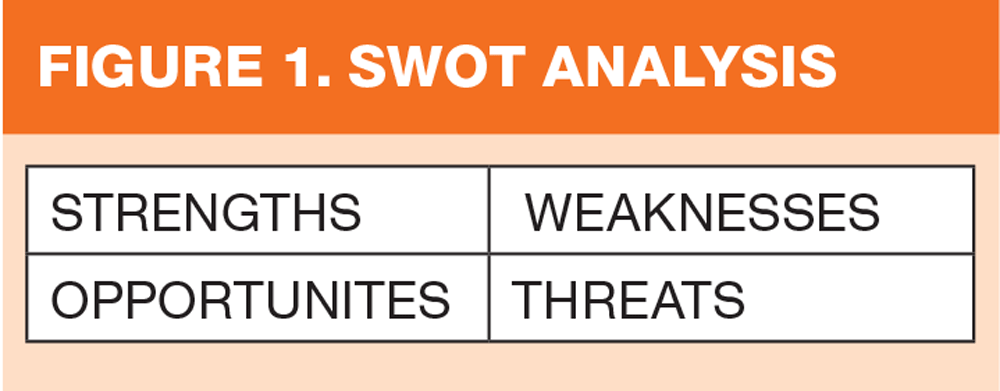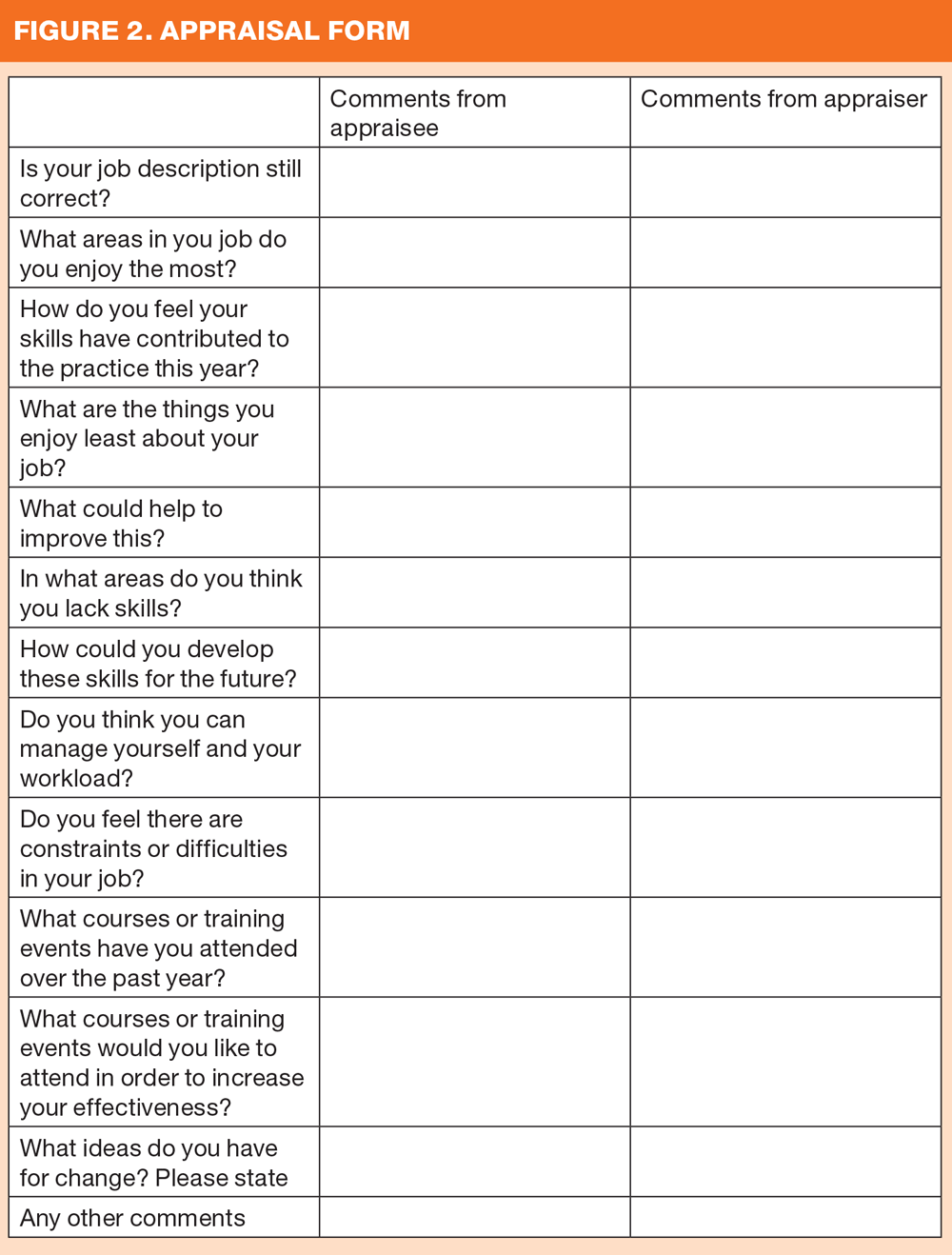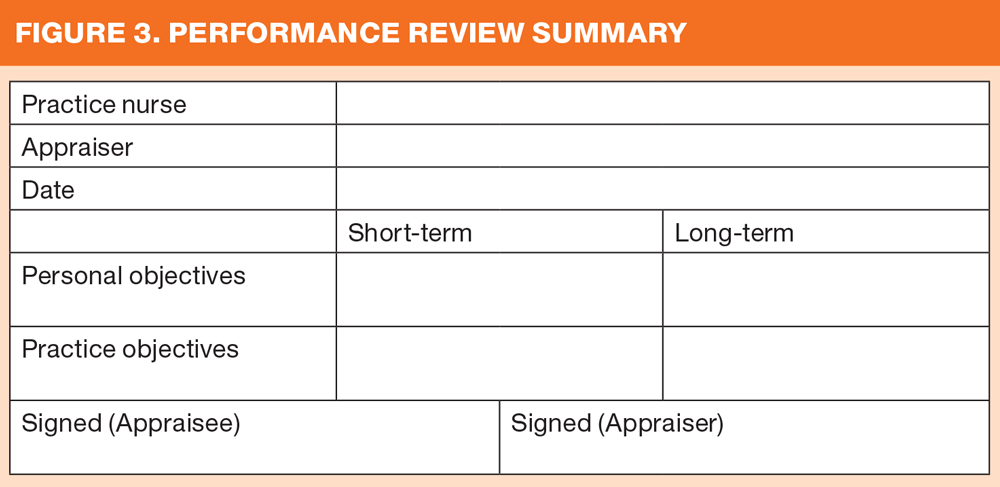Why every practice nurse should have an annual appraisal
Jenny Greenfield
Jenny Greenfield
Specialist Practitioner
— Practice Nursing
Practice Nurse Manager, Peacehaven,
East Sussex
Visiting lecturer, University of Brighton
Appraisal is a fundamental part of professional development and is expected to be critical to the process of revalidation from 2015. But how many practice nurses have one, and even if they do, does it deliver what it is supposed to do?
A definition of appraisal is: 'a professional process of constructive dialogue in which the person being appraised has a formal structured opportunity to reflect on his or her work and to consider how his or her effectiveness might be improved.'1
Appraisal plays a significant role in delivering quality health care in practice by making effective use of each team member's skills. In this article, we look at the process of appraisal from both the appraisee's and the appraiser's perspectives, to allow you to have a clear understanding of what appraisal is, what it is not, and how it should be conducted. If you do not have regular appraisals, ask for one (and leave a copy of this article on your practice manager's or senior GP partner's desk).
Appraisal will make a difference to the smooth running of the practice, and the appropriateness and level of care provided to patients. In order to complete appraisals effectively it is vital that you have thought about the future of your career and how your employer or team could help with any concerns or needs you have. It is also the responsibility of your employer to think carefully about you as appraisals not only guide you in your career development but also enhance levels of patient care by encouraging you to increase your level of competence.2
WHAT IS APPRAISAL?
It is (or should be):
- An interview or discussion usually between an appraiser and staff member
- Formal, planned and at fixed intervals
- An opportunity to look forwards and backwards over a set period of time
- A two way process, both parties have a say
- Unbiased and non-judgmental
- To review progress and achievements in previous year and highlight any difficulties/barriers
- To appraise achievements against last year's objectives
- An opportunity to discuss specific areas of the appraisee's job
- To produce a focus for the appraisee's work over the coming year
- To determine goals/objectives for the coming year and to identify, record and plan individual development needs
- To identify development goals to achieve new objectives and take on additional responsibility in the future
- To ensure everyone knows and understands the aims and objectives of the organisation and is working cohesively
- To establish, promote and maintain standards
- Motivating as it involves both parties fully in the process.
APPRAISAL IS NOT...
- A disciplinary process
- A stick to beat people with
- New information
- A telling session
- A form filling exercise
- Done for someone else
FREQUENTLY ASKED QUESTIONS — ANSWERED
Q. Who should conduct the Appraisal/ Performance Review?
A. The person the individual reports to.
Q. Who should be present during the Appraisal/ Performance Review?
A. The individual being reviewed and the appraiser/s conducting the review.
Q. Who should review the practice nurse?
A. This will depend on a number of factors and needs to be decided by each practice to ensure it is the best solution for all concerned.
For example, where there is a senior practice nurse/nurse practitioner leading the nursing team, it is recommended that he/she has responsibility for their appraisals.
The practice will need to consider who is the most appropriate line manager for more senior practice nurses — practice managers may play a role (with regards to administrative management duties) but their lack of clinical involvement may preclude them from appraising their clinical role. Therefore the practice manager and GP together may be more appropriate.
The options might include:
The GP conducts the whole appraisal or performance review with a discussion beforehand with the practice manager to gather information they feel needs to be discussed in relation to the practice nurse's interaction with the rest of the practice team.
Or:
The GP reviews the practice nurse on clinical issues, which are outside the remit of the practice manager. This discussion would take place before the review so that any development needs arising can be incorporated onto the appraisal/performance review document. The performance review itself would then be carried out by the practice manager.
Q. What information should be gathered in preparation for the appraisal?
A. It would be helpful, in advance of the reviews, to have discussion with relevant members of the practice team and the GPs to gather their views on the performance of each individual and issues they perceive need to be discussed during the review.
Q. Who has access to the information after the review?
A. The key to the success of the performance review process is confidentiality as this allows freedom of speech in the review discussion. It is helpful, to provide an overview for the GPs after the reviews, and to share targets set and development requirements to ensure these are in line with the overall practice objectives.
PREPARING FOR THE APPRAISAL SESSION: THE APPRAISEE
Review the previous year, share how the year has been, and your perceived areas of strength and weakness, and possible barriers to success.
- Provide examples of your performance that support your views.
- Include feedback from other members of staff and patients to inform the review
- Share your ideas for objectives for the coming year
- Discuss and come up with an agreed set of objectives
- Discuss and agree possible development areas. Identify ways of addressing these and agree who will ensure these are arranged
- Share your thoughts as to how you would like your career to develop, if appropriate
- Decide on who will write up the paperwork, where copies need to be shared, and dates for review meetings.
Appraisal Review Preparation Form
Have your job description available: check if it is still a true reflection of your role and level of responsibility.
The following statements are designed to help you think about your job, your achievements, the future and any learning or development needs you have.
- The parts of my job I enjoy most are:
- My main achievements since my last review have been:
- The parts of my job I find most difficult are:
- I need the following learning and development to help me fulfill my objectives:
- I have these specific skills that are not being used to their full potential (if applicable):
Also consider any new areas of clinical involvement you would like to undertake.
Are there any other points you would like to discuss during the appraisal meeting?
You should gather evidence of any professional development activities, training or learning — courses or e-learning activities — that you have undertaken in the previous year. Evidence provides objective knowledge on the level of knowledge and skills you use to perform different task and activities in your job. It is useful to regard this as an ongoing process during the year, rather than leave it until the last minute, before your annual appraisal.
SWOT ANALYSIS
Undertaking an analysis of Strengths, Weaknesses, Opportunities and Threats (SWOT) allows the individual to undertake a self-assessment of their performance in the practice. This will provide the appraiser with valuable insight as to how well you think you are doing.
The SWOT analysis must be completed prior to your appraisal. This is a self-assessment for you to consider all your strengths and weaknesses in relation to your current role and to identify any barriers to your optimal performance. (Figure 1)
PREPARING FOR THE APPRAISAL: THE APPRAISER
As an appraiser, it is important that you are as well prepared for each meeting as those you are appraising.1-3 It is primarily your responsibility to set out an agenda and guide the meeting. Figure 2 may provide you with some structure to help to move the meeting forward. Providing a relaxed atmosphere is crucial, but equally it is important not to spend too much time chatting before you move onto the purpose of the appraisal meeting.
Remember that issues should be explored from the perspectives of the practice nurse being appraised and those of your practice, CCG or the NHS as a whole. Keep clarifying what is being said in order that you both share the same perspectives and to obtain a full picture. At the end of the meeting, it is important that the actions are agreed by both of you.
DOCUMENTATION FOR APPRAISALS — USING AN ACTION PLAN
Appraisers must take their responsibility seriously and prepare well for each appraisal, in order to do justice to each unique professional conversation. They should keep themselves up-to-date, not only with the clinical and non-clinical requirements of their own professional role, but also with any developments of the appraisal process in their practice or CCG. They should also keep up-to-date with any new approach to quality assurance of continuing professional development (CPD).1
Instructions for completion of documentation
Keep one copy for the practice employee record, and give one copy to the practice nurse.
Appraisal documentation should always be accompanied by a copy of the job description, as this is an ideal opportunity to review it at the same time.
The appraisal documentation should include a date for informal and formal review (i.e. at 1 year).
The appraisal documentation should be given to the practice nurse at least 1 week prior to the appraisal to allow adequate time for reflection and completion.
It should be made clear that the SWOT analysis MUST be completed before the appraisal can take place.
The action plan should be updated whenever there has been a change — either when a goal is achieved or modified or where a new need is identified. The original version should be retained for discussion at the next review.
The documentation for appraisals includes:
SWOT analysis
Appraisal form
Performance review summary
Action plan.
An effective appraiser will:
- Use description not judgment
- Keep it friendly — verbally and non-verbally
- Identify and reinforce strengths
- Exactly define and mutually agree on problems
- Collect objective evidence
- Collaborate on constructive solutions
- Identify and use 'carrots and sticks' to make it happen
- Not capitulate on the standards.
Here are some ideas of what you should be aiming for in the appraisal process with those you are appraising.2
The practice nurse whom you are appraising needs to meet regularly with you. You need to look at the best schemes and make sure progress is reviewed frequently — annual reviews are insufficient.
Nothing should come as a shock at a formal appraisal interview — ongoing feedback should be a regular feature in people's everyday work in the NHS.
Appraisal is not a substitute for day-to-day supervision, support and feedback on performance.
Appraisers have an ongoing responsibility to ensure that the people they appraise can achieve the agreed objectives and, where necessary, give or direct them to help.
The practice nurse being appraised plays a major part in setting his or her objectives. However, these must be set within the overall framework of what staff in their post and grade are expected to achieve or be able to demonstrate.
Self-assessment is an important part of appraisal, but the appraiser must curb the tendency of individuals being appraised to be unreasonably self-critical.
Appraisal interviews are best conducted on a one-to-one basis.
Any promised level of confidentiality should be respected — the only exception to this is where aspects of poor performance come to light when the appraiser has a professional responsibility to protect patients — this provision should be made explicit at the start of the appraisal process.
At the appraisal
Create an informal and relaxed atmosphere, and put the person being appraised at ease.
Explain the purpose and timing of the appraisal meeting, and what outcomes you expect.
Agree the 'ground rules' (See Box 1) including any limits set on confidentiality (such as belief that patient safety may be at risk).
Share your intended agenda and invite the person being appraised to add any issues or items.
Discuss how you will be taking notes, and what will happen to your records.
Encourage the person being appraised to review his or her performance as you talk through achievements of their previous PDP.
Let the person being appraised do most of the talking.
Follow your pre-prepared structure, but be flexible and vary the timing according to the other person's needs.
Types of questions to ask
The range of questions you might pose when you review progress from the last appraisal and/or review of a the appraisee's Personal Development Plan (PDP) might include:
- What did you actually do?
- What had you hoped to achieve?
- What did you actually achieve?
- Did any learning points crop up unexpectedly?
- How would you describe the personal benefits?
Some prompts to reflect on during the appraisal:
- National and local priorities
- Review of any significant event analysis
- Review of audits and protocol developments
- Review of prescribing data and referral data
- Working relationships with colleagues
- Any feedback from or involvement from patients
- Last year's PDP and goals set within it.
Discuss the person's performance, focusing on facts and avoiding subjective judgments. You could structure discussion around the three domains of: knowledge, skills and attitudes, or the core competences of the specialty, discipline or post of the person you are appraising.
Give feedback by emphasising positive points and encouraging the appraisee to reflect on and value achievements.
Discuss any areas where the appraisee's performance could have been improved and why — issues may be personal, operational or relate to the limited availability of resources or training opportunities.3
You should also use appraisal to set mutually agreed objectives for learning or development, which describe what the individual should be able to demonstrate, within an agreed time frame (Box 2).
HOW TO GIVE CONSTRUCTIVE FEEDBACK
How effective feedback is often depends on when you give it. Feedback that is detailed and requires discussion is always best given while memories are fresh and clear. So, do it soon after the event. But you also need to notice how open the person on the receiving end is.
You should never aim critical feedback at the person, only at their work. People are not what they do. They can change behaviour and performance but they can't change who they are.
Constructive feedback works because while behaviour can be changed, personality can't. It is one of the most valuable skills that managers can learn. It satisfies people's needs to know how they're doing. It delivers review in an upbeat, non-judgmental way that people can accept. It builds people's confidence to do better
CONCLUSION
In the White Paper on the regulation of health professionals in the 21st Century,4 the Government states that the appraisal process with the NHS should be formative and summative, to ensure objectively that the required standards are met. This is also going to be important to demonstrate that PDPs are in place in preparation for revalidation with the NMC from 2015.
REFERENCES
1. The Good Appraisal Toolkit for Primary Care R.Chambers, A. Tavabie, K.Mohanna, G.Wakley. Oxford; Radcliffe Publishing: 2004
2. Royal College of General Practitioners framework for General Practice Nurse competencies, 2014 http://www.rcgp.org.uk/membership/practice-teams-nurses-and-managers/~/media/Files/Membership/GPF/RCGP-GPF-Nurse-Competencies.ashx
3. Royal College of Nursing. Discussing and preparing evidence at your first personal development review: guidance for RCN members on the NHS Knowledge and Skills Framework. RCN, 2006 (Publication code 003 061)
4. Department of Health. Trust assurance and safety: the regulation of health professionals in the 21st century. London; Stationary Office London (CM7823): 2004
Related articles
View all Articles
